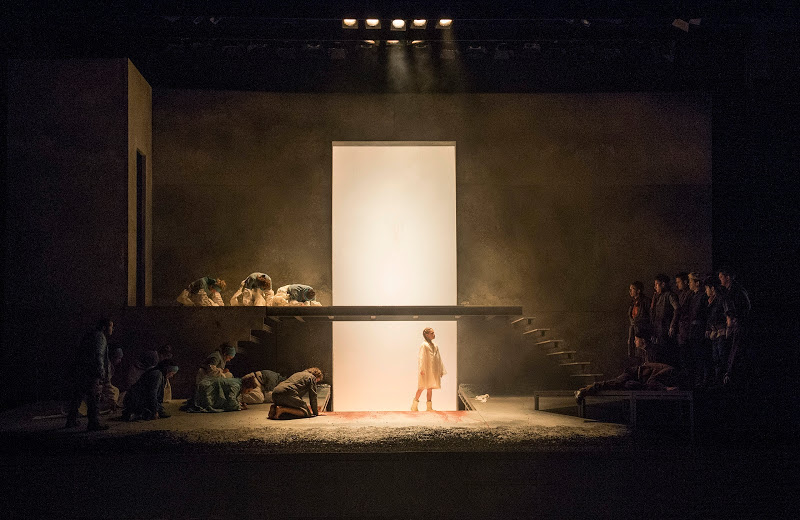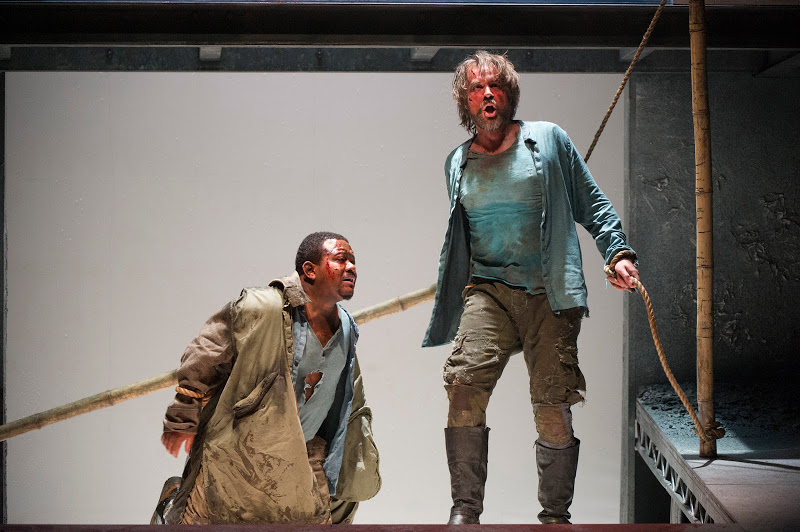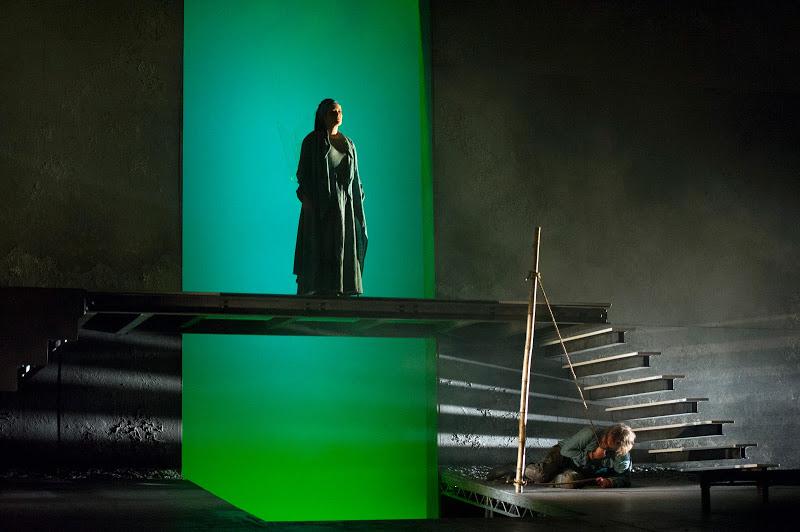Gluck's two operas about the daughter of Agamemnon saved from sacrifice only to serve as priestess-butcher herself have found their level on the contemporary operatic stage. Not that the handful of UK productions or their casts in recent years have quite matched the pared-away beauty of his peculiar classicism: neither Iphigénie en Aulide at Glyndebourne nor the Royal Opera's Iphigénie en Tauride have stuck in the memory, and I doubt if ETO's brave shot at the second opera will either.
Iphigenia's tortuous path to reunion with brother Orestes finally calms the chain of murders triggered by her putative sacrifice – her mother Clytemnestra's axing of Agamemnon, Orestes' revenge upon his mother – with the redemption of romance, as if they need not have happened after all. There is a degree of redemption here, too, for ETO's General Director James Conway, set and costume designer Anna Fleischle and lighting designer Guy Hoare after their unfortunate King Priam. Fleischle's stairways, platforms and ramps now draw the eye towards goddess Diana's sacrificial altar space, variously and beguilingly lit by Hoare, while blood, water and earth frame this perfect design for classical tragedy. It all looked especially handsome in the Hackney Empire, first stop on the ETO tour, last night.

Conway, too, is mostly better with groupings than he was in the topsy-turvy, cluttered Priam, helped by a strong, select chorus, though the hugger-mugger of Scythians dragging on the new arrivals to their barbarous realm obscures Orestes to concentrate upon some rather half-hearted knife cuts inflected upon his poor mate Pylades. There are some strong touches: Iphigenia's backstory as a young virgin slated to be slain by her own father so the Greek fleet could sail to Troy justifies a plucky little girl, Pepper Cometti in Hackney, to sing the dea ex machina role of Diana, exonerating all before sploshing around in her wellies in the water at the back of the stage (the scene pictured above).
The director could have worked harder on body language and gesture. While Catherine Carby knows exactly what to do to express Iphigenia's pain and dignity, using the French language to heighten the plangency, the men don't properly connect – least of all with the ETO Orchestra, natural in simplicity but hardly fizzing with energy under Martin André when the action requires it. A period-instrument guttiness would have served Gluck's directness better, and it was a shame the usually piercing oboe solo in the climactic "O malheureuse Iphigénie" soon disappeared beneath the string textures.
 Carby, then, holds the compact drama together, with help from Gluck's directness and refusal to dwell on the arias stitched so seamlessly into the music-theatre fabric. A mezzo with an imperfect top in the soprano realm is always going to be challenged, but it's worth it for the vibrant warmth of Carby's middle register, oddly reminiscent of Diana Montague, a fine exponent of the role. Grant Doyle pushes Orestes' anguish too much, as if he were a Flying Dutchman faced with a dense orchestra, though he's dignified when it comes to the inevitable sacrifice. The role of devoted friend Pylades – deep gay love, the only physical kind in the drama, is not shirked in this production – needs a high-tenor limpidity, and John-Colyn Gyeanty's inability to spin a line proves a serious drawback here, though he can do intensity (the loving friends pictured above left). Craig Smith as Thoas needs physical loosening up; the way he stands doesn't help vocal production.
Carby, then, holds the compact drama together, with help from Gluck's directness and refusal to dwell on the arias stitched so seamlessly into the music-theatre fabric. A mezzo with an imperfect top in the soprano realm is always going to be challenged, but it's worth it for the vibrant warmth of Carby's middle register, oddly reminiscent of Diana Montague, a fine exponent of the role. Grant Doyle pushes Orestes' anguish too much, as if he were a Flying Dutchman faced with a dense orchestra, though he's dignified when it comes to the inevitable sacrifice. The role of devoted friend Pylades – deep gay love, the only physical kind in the drama, is not shirked in this production – needs a high-tenor limpidity, and John-Colyn Gyeanty's inability to spin a line proves a serious drawback here, though he can do intensity (the loving friends pictured above left). Craig Smith as Thoas needs physical loosening up; the way he stands doesn't help vocal production.
It's true that Gluck and his librettist Guillard don't make it easy for us to feel deep emotion for their characters. Everyone is expected to know them as the archetypes of Greek tragedy, and the singers need to express their states of being immediately. The crucial sympathy is missing here; pity and terror, especially for Orestes' pursuit by the Furies, remain unstirred. That makes the opera a hard sell for audiences around the country, and I can't help feeling that Conway's persistence with the rare and not always rich – Donizetti and Haydn falling into the latter category – isn't exactly going to win a love of opera at its most searing from first-time operagoers in the regions. But maybe the Don Giovanni, playing in repertory with this Iphigénie and Donizetti's Pia de' Tolomei, will make amends.















Add comment